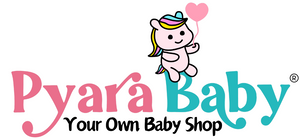Baby's Milestones and Development in their First Year
Tracking a baby's milestones and development during their first year is an incredible journey. Here's a breakdown of what to expect in terms of growth, development, and milestones during this crucial period:
Physical Development
1-3 Months:
- Head Control: Initially, babies have limited control, but by three months, they can hold their head up momentarily when lying on their stomach.
- Grasping: They start to develop a stronger grip, holding onto objects placed in their palm.
- Reflexes: The Moro reflex, where they startle in response to loud noises or sudden movements, is prominent.
4-6 Months:
- Rolling Over: Many babies start rolling from tummy to back around four months and back to tummy around six months.
- Sitting: Some babies can sit with support or briefly without support around six months.
- Hand-Eye Coordination: They begin to reach for and grasp objects deliberately.

7-9 Months:
- Crawling: Many babies start to crawl, using their hands and knees for movement.
- Pulling Up: They may start pulling themselves up to stand using furniture or support.
- Improved Motor Skills: They can pass objects from one hand to another.

10-12 Months:
- Standing and Cruising: Some babies can stand momentarily without support and may start cruising along furniture.
- First Steps: Towards their first birthday, some babies take their first steps or start walking with assistance.
- Fine Motor Skills: They improve their ability to pick up smaller objects using the pincer grasp.
Cognitive Development

0-3 Months:
- Recognizing Faces: They start recognizing familiar faces and responding to smiles.
- Tracking Objects: They can follow moving objects with their eyes.
4-6 Months:
- Object Permanence: Babies begin to understand that objects continue to exist even when they are out of sight.
- Exploration: They start exploring objects by shaking, banging, or dropping them.
7-9 Months:
- Understanding Cause and Effect: They start comprehending simple cause-and-effect relationships, like pressing a button to make a toy play music.
- Imitation: Babies may start imitating sounds or actions.

10-12 Months:
-
Simple Problem Solving: They may
 attempt to solve simple problems, like figuring out how a toy works or how to reach a desired object.
attempt to solve simple problems, like figuring out how a toy works or how to reach a desired object. - Simple Gestures and Words: Some babies begin to wave goodbye, point at objects, or say a few simple words like "mama" or "dada."
Social and Emotional Development
0-3 Months:
- Attachment: Babies begin forming attachments with primary caregivers, seeking comfort and closeness.
4-6 Months:
- Social Smiles: They start smiling in response to others' smiles and may show preferences for familiar faces.
7-9 Months:
- Stranger Anxiety: Babies might become wary of strangers and show preferences for familiar people.
- Expressing Emotions: They start expressing a wider range of emotions like happiness, frustration, and excitement.
10-12 Months:
- Increased Independence: They may show signs of wanting to do things independently.
- Imitating Behaviour: Babies start imitating behaviours they observe in others, such as clapping or waving.
Speech and Language Development
0-3 Months:
- Cooing: Babies start making cooing sounds and gurgles.
4-6 Months:
- Babbling: They start making repetitive sounds like "bababa" or "dadada."
7-9 Months:
- Understanding Words: Babies might start understanding simple words or commands.
- Varied Babbling: Babbling becomes more varied and may sound more like real speech.
10-12 Months:
- First Words: Some babies say their first words, usually simple ones like "mama" or "dada" or “papa.”
- Gesture-Word Combinations: They may combine gestures with words to communicate.
Conclusion
Every baby develops at their own pace, so these milestones serve as general guidelines. It's essential to observe and celebrate the progress while also understanding that deviations from these timelines aren't necessarily cause for concern. Babies develop uniquely and might reach milestones at different times. Regular check-ups with a pediatrician can provide reassurance and guidance about your baby's growth and development. Enjoy this incredible journey of discovery and growth with your little one!


